- Home
- Jane Green
Dune Road Page 10
Dune Road Read online
Page 10
Then that invitation to sail around the Mediterranean on Plum Apostoles’s yacht. They had already met a number of times, and Robert knew that Plum was Penelope’s latest conquest. He had seen the hurt in Ileana’s eyes when Penelope had led Plum upstairs, led him by the hand, turning on the stairs to kiss him fully and passionately in front of the rest of the people in the room, who applauded and laughed.
Ileana was attractive and sweet and so obviously ill at ease in this world. He took pity on her, took her to bed that night. Tried, with his actions, to apologize for the behavior of his wife.
He hadn’t wanted to go on the yacht, but Plum had decided he wanted to make it in the movie business, and was one of the major investors behind the smaller studio that was making Robert’s next movie. It was a business move. Nothing more.
Penelope came to bed in the early hours of the morning, ignoring Ileana, who, embarrassed, scuttled out, not before hearing Penelope belittling Robert, laughing at him, accusing him of being hopeless in bed, and feeling sorry for Ileana.
“You are a joke,” she hissed, turning to go up to the deck, and this time, for the first time, Robert lost his temper.
Perhaps lack of sleep, perhaps the wrong combination of drink and drugs, perhaps the final straw, but Robert felt a surge of temper at being dismissed, yet again, in front of someone else, and he followed her up to the deck and stood over her, almost nose to nose.
“Shut the hell up!” he shouted, louder than he expected.
“Why? Because you know it’s true? Because you’re not really a man, you’re just a pathetic little boy? A pathetic little boy who doesn’t know how to keep a woman happy?” She glared at him, then spat at him, full in the face.
He grabbed her arm, and something about the look in his eyes suddenly told Penelope he’d had enough, and she backed away from him, stumbling as she hit the railing.
And Robert stopped. It wasn’t worth it. They just needed to divorce. To stop making each other so miserable.
“You’re pathetic,” he whispered. “It’s not worth it.” He turned to go back.
Penelope flung out an arm to slap him, as she had so many times before, and she lost her balance.
No sound. Not a shriek, not a scream, nothing.
Robert heard the splash as he was walking down the stairs. He ran back up, and Penelope had vanished. He turned, his face white, to see Plum.
“Stop the boat!” Plum said. “I saw her go over. Get the crew up now ! ”
By the time they were flown back, accompanied by the police, by the press, he was a changed man. Or perhaps unchanged. It was a terrible, tragic accident, and he blamed himself. If he hadn’t lost his temper she wouldn’t have backed away, wouldn’t have been scared of him.
He ran the tape of that night over and over in his head for months. Finally he started to forgive himself, started to understand that no amount of guilt could change what had happened.
As he healed, he began to live the life he had always thought he was going to lead, before Penelope came into it, just with more money, more people wanting more things from him.
For he had come to realize that his life with Penelope was not what he would have chosen.
He had felt like an impostor much of the time, had known he didn’t fit in, found peace only when Penelope and the entourage that always surrounded her were traveling and he could be in the house by himself, build a fire and sit in an armchair with the papers, reading quietly, no need to be anywhere else, to see anyone else, to be doing anything else.
He stopped returning calls, burned the hundreds of condolences that arrived in his mailbox every day, didn’t answer the door to the flowers that arrived. He also stopped writing for a couple of years, finding that there was only one story that needed to be told back then, and he couldn’t tell that story, would never be ready to tell that story.
Until now. Until the idea of a mystery, of a series of mysteries raised its head. Last night, for the first time, he managed to stop worrying about where to find an idea for a mystery, and lost himself in the quiet breathing of his yoga class.
And afterward, he mentioned to Tracy that he was thinking about a mystery, and she said what a wonderful idea, and pointed out, laughing, that he had been at the center of a mystery of his own, and perhaps he could use his own story as inspiration.
The more he thinks about it, the more he realizes Tracy has definitely hit upon something—what better mystery than the one surrounding the death of Penelope?
It won’t be his story. He will never tell his story entirely, but he can always write it, then change it. Write it as it was, then change the names, change the facts, make sure to disguise it so people don’t know.
He can draw upon his life, write about that unique time in history, the parties, the people, the atmosphere of freedom, of possibility, that has never existed before or since.
He can write about a free-spirited actress, a woman whom everyone adores, who chooses to seduce a scientist, perhaps, a serious, quiet man who falls under her spell, who feels as though he is playing a part in a movie of his own making, until the movie turns dark and he doesn’t know how to get out.
He will change the ending, of course. Not Plum and Ileana, but maybe Vladimir and Alla. Or Marco and Francesca. Or Serge and Jeanne. And it will not be a yacht sailing around the Mediterranean, but possibly a vacation at a villa in the hills above St. Tropez, a vacation where it all goes wrong.
He will write about the mystery of Vladimir/Marco/Serge. How he is a man of significant means, but has come about those means in dubious ways, rumors swirling about larceny, impersonation and deceit.
He loves the idea of writing it under a pseudonym. But not Robert McClore writing as someone else. A true pseudonym, one that will never be linked to him. What a genius idea, what a perfect solution to this book that will otherwise undoubtedly garner huge media attention.
He can also, he supposes, use a ghostwriter, although might the subject matter be too sensitive?
As a writer Robert often puts his own life into his books, often without realizing it—but a ghostwriter? How would he possibly know the details? He would imbue the writing with details of his own, details pulled from his imagination, or from his own life.
Robert could write the storyline, could draft each chapter, describe the characters, and then leave it up to a ghostwriter to fill in the blanks.
He will have to decide which path to choose.
And in the meantime, he will have to give the yoga girl a call. He has met her a few times since the initial book reading, but his physical attraction for her increased enormously during their private lesson.
He keeps thinking of her pert bottom pointing up at the ceiling in Downward Dog, the way her T-shirt fell forward over her breasts, giving him a glimpse of her firm stomach. He shivers. He hasn’t felt such a strong attraction for a woman for a very long time.
How can he possibly let this pass?
Chapter Ten
Kit opens her eyes and looks at the clock: 9:03. A brief moment of panic before she sinks back in the pillows with a smile. Of course. Saturday. The kids are with their dad, and she has the whole weekend to herself. No work, no phone calls, no rushing through breakfast to get the kids on the bus, just hours of wonderful leisurely time to do whatever she chooses.
Right now she chooses to stay in bed, to replay every wonderful second of her date with Steve last night.
He picked her up from home, and she could see from the look in his eyes that her choice of the gauzy navy form-fitting dress was perfect.
They went to the Highfield theater to see the new David Hare play, and shortly after curtain up Kit realized how close the seats were: her leg was pressed up against Steve’s, and there was nowhere to move it to. Suddenly she realized that the buzzing she was feeling, a buzzing that was so loud it was virtually drowning out the voices of the actors on stage, was lust.
It was so strong, it was almost palpable, like a current of electricity runnin
g between them; unexpected, entirely new, she spent the entire play lost in fantasies of her and Steve.
When the intermission arrived, she was so embarrassed at what he had been doing to her in her head for the past hour and a half, she could barely look at him.
They hadn’t bothered with dinner. They had left the theater, walking awkwardly to the car, Kit aware only of this incredible connection between them, and as they reached the car he grabbed her and started to kiss her, and—she swore she didn’t think this could ever actually happen—her knees went weak.
They sat in the car for an hour, making out. He drove her home and they sat in the car for another hour, making out. Nothing more, not yet. She wasn’t ready for more, and he didn’t push.
But oh joy, oh the joy of feeling these feelings she thought were dead forever. Oh the joy of finally meeting a man who may not be Mr. Right, but is certainly good for Mr. Right Now.
And more, the joy of feeling heard. Seen. She hasn’t realized, until now, how low her self-esteem has been, first during her marriage, when she tried to turn herself into someone else, and then when recovering from the knock of her divorce.
Because however much she was a part of the decision to divorce, she still felt bruised and battered, never thought that she would have the energy or the will to go through all this again with someone new.
It has been so much easier, since she separated from Adam, to be cocooned with her family, to nest in her cozy home and allow life to carry on for others, outside the safety of her house.
Perhaps tonight will be the night, for the house is empty, and Steve said he wanted to see her this weekend. Perhaps she should get ready to finally do the unthinkable, to sleep with someone other than Adam, the only man she has slept with for almost twenty years.
She wants to, and doesn’t want to. The truth—as hard as it is for her to admit it—is that the only man with whom she still feels truly safe is Adam.
But Adam is her past. And Steve, if not her future, is certainly her here and now.
With a yawn and a stretch, she finally manages to drag herself out of bed, and opens the blinds in the bedroom to let the sharp autumn sunlight slice through.
A movement outside catches her eye and she moves closer to the blinds. There is a woman standing on the sidewalk across the street who seems to be looking at the house. She turns briskly and walks off, but Kit is slightly disconcerted.
Not that it is unusual to see people walking in this neighborhood, but this woman has no dog, no friends out on a power walk. In fact, she isn’t even wearing walking shoes. And although there wasn’t much time to see her face, there was something familiar about her.
By the time Kit has shrugged on her robe and gone downstairs to put coffee on she has forgotten about the woman outside. She lights a fire, collects the New York Times from the driveway and sticks a bagel in the toaster.
“Hello? ” The back door opens and Edie walks in. “Don’t tell me you’ve forgotten about our date today,” she says, frowning, as she sees Kit in her bathrobe. “You’re taking me to the pumpkin patch, remember? ”
“I didn’t forget!” Kit smiles. “Of course we’re going. I just had a slow start this morning. If you let me finish this bagel I can be ready to go in ten minutes. Want some coffee? ”
“Sure.” Edie sits down at the table and squints at Kit. “What’s going on with you? ”
“What do you mean? ”
“I mean, you can’t stop smiling. You look like a girl who’s fallen in love.”
“Oh Edie!” This time the grin stretches across Kit’s face. “That’s ridiculous.”
“It may be ridiculous but you certainly look like the cat that got the cream. So go on, then, tell me if I’m right. Are you falling in love? ”
“Well . . . I’m definitely falling in like.”
Edie peers at her. “And he likes you? ”
“I don’t know.” Kit shrugs. “But I hope so. I mean, I think so.”
“So what do you like about him? Is it the fact that he’s around six foot, six foot one, dark hair, tanned skin, very handsome in his brown suede jacket? ”
Kit looks at her in shock.
“How do you know? ”
“Because he just walked up your garden path and—”
The doorbell interrupts her.
“—I was going to say he’s about to ring your doorbell.”
“Oh shit!” Kit says. “What’s he doing here?” She gestures down at herself in horror. “I can’t go to the door like this.”
“Run upstairs,” Edie says with a smile. “I’ll go. But be quick.”
“Hello.” Edie looks at him coolly.
“Hello.” Steve seems uncomfortable, holding a huge bouquet of red roses and clutching a bottle of champagne in the other hand.
“For me?” Edie, naughtily, sighs in pleasure and places a hand on her chest.
“Er . . . actually, I was looking for Kit? ” he says uncertainly.
“She’s upstairs,” Edie says. “Come in. I’m Edie. I live next door.”
“Lovely to meet you,” Steve says, putting the champagne down and reaching out to shake Edie’s hand, looking directly into her eyes as he says it with warmth and meaning.
Wow, Edie thinks. He’s good.
“Come into the kitchen,” Edie says, leading the way as Steve follows. “Is it someone’s birthday? ” she asks.
He laughs. “I just wanted to drop something nice off for Kit.”
“That’s certainly very nice. I’m sure she’ll be impressed.”
He frowns. “I wasn’t trying to impress her. I just wanted her to know what a lovely time I had last night. We went to the theater.”
“I know. It sounds like a wonderful play.”
“It was.”
They sit in silence for a while, Edie quite comfortably, Steve looking around the room, clearly wishing that Kit would come downstairs.
“So how long have you lived in Highfield?” Edie says, finally.
“Just a couple of months.”
“Have you found it a good place to meet people? ”
“I met Kit”—he smiles—“so I’d have to say yes.”
“True. But uprooting becomes much harder, the older we get. Do you have any family or friends here? ”
“I don’t.” He shakes his head sadly. “But I’m a pretty outgoing guy. I’ve joined the gym and I’m doing quite a bit of stuff. I hadn’t expected everything to be so family-oriented here. It’s not really the place for a single guy, other than, of course, the number of divorced women.” He laughs, then catches himself. “Not that I’m looking at other divorced women.”
“Of course not.” Edie winks at him. “Well, welcome to suburbia, I guess. That’s what it’s like. Tell me, do you play tennis? ”
“Sure,” he says.
“Good. You can join my tennis game next weekend. We’re one short. Len Blackman just dropped out.”
“I . . . er . . . when is it? My weekend is a little busy.”
“Nonsense,” Edie says sharply. “It’s Saturday morning, ten o’clock at my friend Rose’s house—in View Point Drive. We’ll expect you there and I won’t take no for an answer.”
They both look up as Kit clatters down the stairs in jeans and a gray sweater, hair pulled back in a ponytail, face now washed and clear.
Standing up, Steve adjusts his expression to one of pleasure.
“Steve! ” She walks over, catching sight of the roses and champagne, and blushes wildly. “What are you doing here? ” She stops in front of him, wants to kiss him, but feels awkward, and couldn’t kiss him in front of Edie, anyway.
“I just wanted to thank you for last night.” He smiles down at her.
“Last night? But I didn’t do anything.”
“You didn’t have to. I just . . . well . . . these are for you.”
“Oh Steve. They’re so beautiful.” Kit turns and opens cupboards, ostensibly to look for vases, but in fact to hide her face, red with emb
arrassment and pleasure.
“I should go,” he says, moving toward the door. “I didn’t mean to embarrass you by turning up unexpectedly. I was just going to leave them on the doorstep but I saw someone in the kitchen and wanted to see you. Maybe I can see you later? ”
“That would be nice,” Kit says, beaming.
“I’ll call you this afternoon.”
“Well?” She can’t help herself. She expected Edie to pass judgment as soon as Steve left the house, but so far she’s said nothing.
They are in the car, on their way to the pumpkin patch, and Kit is trying not to say anything, wanting Edie to bring up the subject first, but she just can’t wait.
“Well, what? ” Edie says innocently.
“What did you think of him? ”
There’s a long pause, and as they pull up to a light Kit turns to Edie, who sucks her teeth.
“I don’t like him.”
Kit starts to laugh. “No, seriously, Edie. What did you think of him? ”
“Seriously? Kit, have you ever known me to mince my words or tell you anything other than the truth, even if I know it’s absolutely the last thing in the world you want to hear? ”
Kit’s heart starts to pound.
Edie sees the expression on Kit’s face and backtracks immediately. “Oh Kit. I don’t know him at all, which is why I asked him to play tennis next weekend. I want to see if I’m wrong, but my first impressions are almost always right. I’m a little bit of a witch, you know, and I pick up on things. I just don’t trust him. And red roses and champagne? For no reason? It feels like he’s trying too hard, and I’m not comfortable.”
Kit is shocked. She wants to say something, but she is stunned that Edie has been so . . . disparaging. So honest.
“Kit, my dear,” she continues, “I’m not saying don’t see him, I’m just saying that he’s walked into your life and you know nothing about him, and you need to be careful. For all we know, he’s a con artist.”
“Oh Edie,” Kit snorts, “don’t be so dramatic. You’ve been watching those crime series on TV again, haven’t you? ”

 Saving Grace
Saving Grace Summer Secrets
Summer Secrets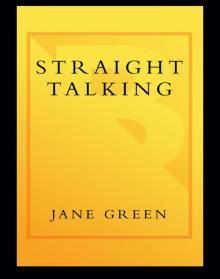 Straight Talking
Straight Talking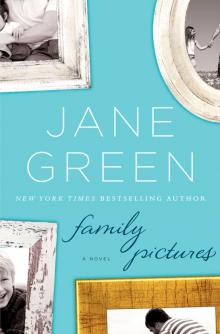 Family Pictures
Family Pictures The Holiday
The Holiday Promises to Keep
Promises to Keep Second Chance
Second Chance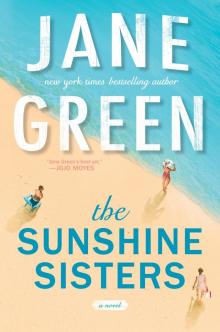 The Sunshine Sisters
The Sunshine Sisters Dune Road
Dune Road Bookends
Bookends The Beach House
The Beach House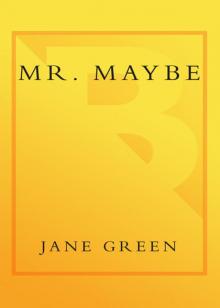 Mr. Maybe
Mr. Maybe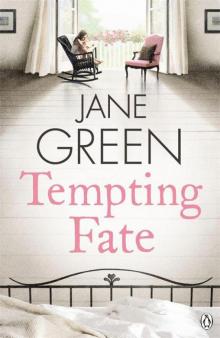 Tempting Fate
Tempting Fate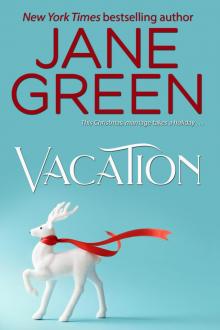 Vacation
Vacation The Other Woman
The Other Woman The Friends We Keep
The Friends We Keep To Have and to Hold
To Have and to Hold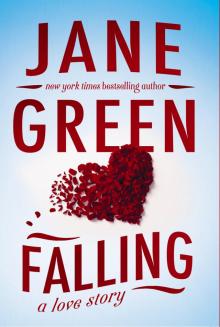 Falling
Falling Swapping Lives
Swapping Lives This Christmas
This Christmas Life Swap
Life Swap Cosmo's Sexiest Stories Ever
Cosmo's Sexiest Stories Ever